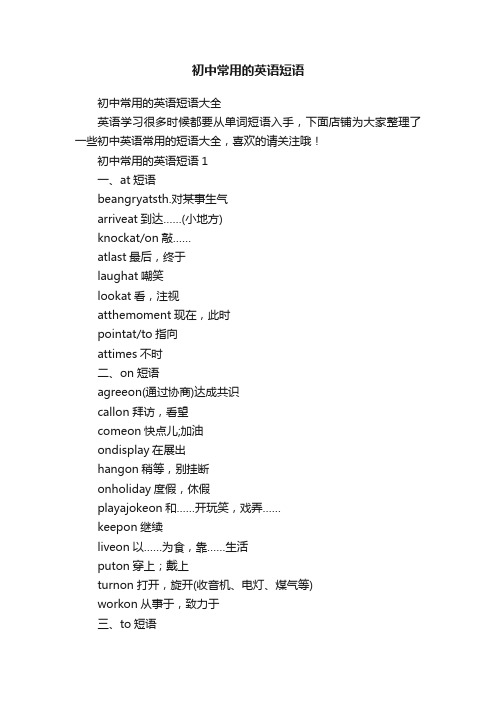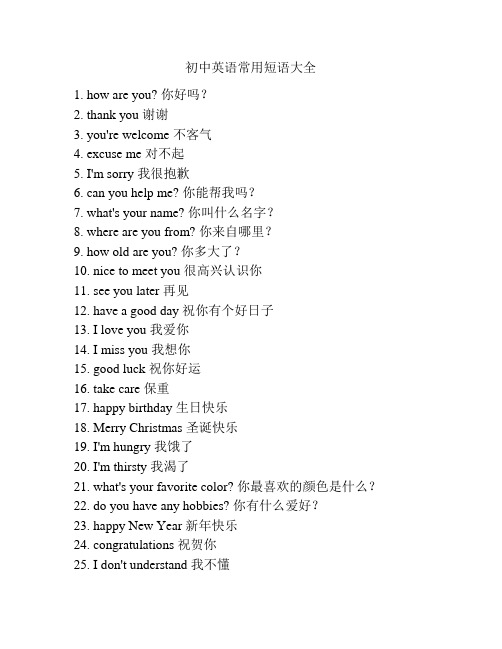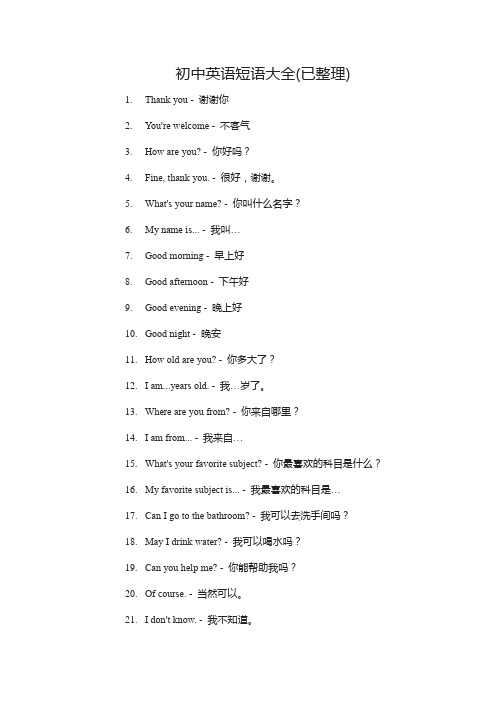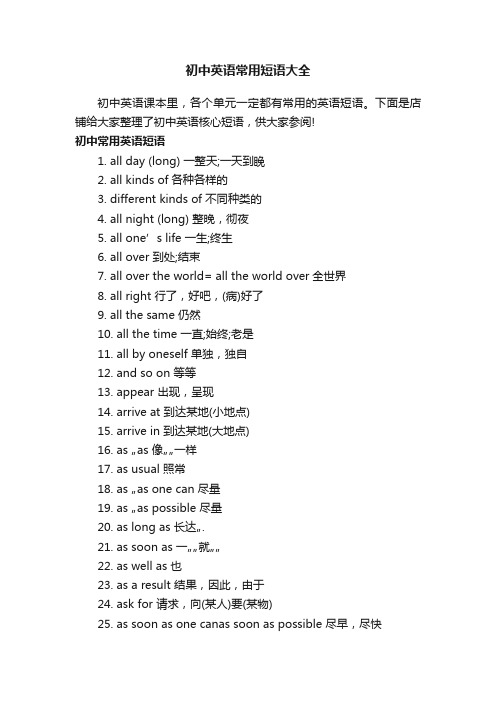初中英语常见短语
初中常用的英语短语

初中常用的英语短语初中常用的英语短语大全英语学习很多时候都要从单词短语入手,下面店铺为大家整理了一些初中英语常用的短语大全,喜欢的请关注哦!初中常用的英语短语1一、at短语beangryatsth.对某事生气arriveat到达……(小地方)knockat/on敲……atlast最后,终于laughat嘲笑lookat看,注视atthemoment现在,此时pointat/to指向attimes不时二、on短语agreeon(通过协商)达成共识callon拜访,看望comeon快点儿;加油ondisplay在展出hangon稍等,别挂断onholiday度假,休假playajokeon和……开玩笑,戏弄……keepon继续liveon以……为食,靠……生活puton穿上;戴上turnon打开,旋开(收音机、电灯、煤气等)workon从事于,致力于三、to短语agreeto同意,答应,接受(计划、建议、条件、安排等) gotobed上床睡觉compare...to...把……与……作比较from...to...从……到……getto到达doharmto对……有害处leadto通往;导致payattentionto注意toone’ssurprise使某人吃惊的是take...to...把……带到/给……writeto...写信给……四、in短语arrivein到达……(大地方)indanger在危险中dropin顺便拜访handin交上,上交joinin参加inamoment马上,立即。
初中英语常用短语大全

初中英语常用短语大全1. how are you? 你好吗?2. thank you 谢谢3. you're welcome 不客气4. excuse me 对不起5. I'm sorry 我很抱歉6. can you help me? 你能帮我吗?7. what's your name? 你叫什么名字?8. where are you from? 你来自哪里?9. how old are you? 你多大了?10. nice to meet you 很高兴认识你11. see you later 再见12. have a good day 祝你有个好日子13. I love you 我爱你14. I miss you 我想你15. good luck 祝你好运16. take care 保重17. happy birthday 生日快乐18. Merry Christmas 圣诞快乐19. I'm hungry 我饿了20. I'm thirsty 我渴了21. what's your favorite color? 你最喜欢的颜色是什么?22. do you have any hobbies? 你有什么爱好?23. happy New Year 新年快乐24. congratulations 祝贺你25. I don't understand 我不懂26. can you repeat that? 你可以再重复一遍吗?27. I'm tired 我累了28. I'm bored 我无聊29. I'm excited 我很激动30. I'm happy 我很开心。
初中英语短语集合

初中英语短语集合1. turn on 打开2. turn off 关上3. nearly every day 几乎每一天4. all kinds of各种各样5. at the bus stop 在公共汽车站6. get on 上车7. get off 下车8. wait for 等待某人9. show sb.round 带领某人参观某地10. be busy doing sth.忙于做某事11. traffic lights 交通灯12. move on 继续前进13. be ready for 为…做准备14. slow down 减慢速度15. zebra crossing 人行道1. how about怎么样2. walk through 走过3. go down the street 沿着这条街走4. excuse me 请原谅5. at the end 在终点6. turn left right 向左右转7. want to do sth.想要做某事8. next to 旁边,隔壁9. be all right 身体好了10. one…the other 一个,另一个11. be on 演出12. be over结束13. yesterday evening 昨天晚上14. It's good bad for… 对…有好处坏处15. once a week 每周一次1.be born 出生于2.visit sb 拜访某人3.tell sb. sth. 告诉某人某事 tell sb.to do sth.告诉某人做某事4.tell sb.not to do sth.告诉某人不要做某事ateII sb.how to do sht 告诉某人怎样做某事bgo to a place to do sth 去某个地方做某事cgo to England to study English 去英国学习英语5.study at a middle school 在中学学习6. go boating 去划船 go fishing 去钓鱼7.go swimming 去游泳 go shopping 去购物 go skating 去滑冰8.at weekends 在周末9.at the age of 在……年龄10e here at half past two every Saturday afternoon 每个星期六下午两点半来这儿11.take pictures 照相12.in one’s spare time 在业余时间13e here to do sth. 来这儿做某事14e in 进来15.sit down 坐下 stand up 起立16.ask sb. some questions 询问某人一些问题17.on May 2,1984 在1984年5月2日18.tell sb. the name of the street and the house number 告诉某人街道名字和房间号码19.like doing sth. 喜欢做某事 like to do sth.喜欢做某事20.become a teacher 成为一名教师 want to be a doctor 想成为一名教师看过的人还:感谢您的阅读,祝您生活愉快。
初中英语短语积累

初中英语短语积累初中的词汇量想要增多,就离不开平时对于英语短语的积累。
下面是店铺给大家整理的初中英语短语积累,供大家参阅!初中英语短语11. in the afternoon 在下午2. in winter 在冬季3. make a snowman 堆雪人4. put on 穿上,戴上5. Chinese food 中国食物6. my parents 我的父母7. two American boys 两个美国男孩8. a new student 一名新生9. study English 学英语10. thank you 谢谢11. in China 在中国12. speak Japanese 讲日语13. very well 很好14. only a little 只有一点15. a department store 百货商店初中英语短语21. play football 踢足球2. be good at 擅长3. on the basketball team 在篮球队4. scoot at the basket 投篮5. the first us 第一班车6. at eight 在八点7. hurry up 快点8. a quarter past ten 十点一刻9. five to eleven 差五分十一点10. the next train 下一趟火车11. on Monday 在周一12. a ticket for Shanghai 一张飞往上海的机票13. at home 在家14. a good idea 好主意15. go skating 去滑冰初中英语短语31.at the party 在聚会上2.in a low voice低声的3.give sb sth or give sth to sb 给某人某物4.enjoy one′seIf 玩很高兴5.have a party 聚会6.make friends with sb 和某人交朋友7.each other相互8.think of 认为9.a lot of 许多10.enjoy doing sth.喜欢做某事11.do morning exercise 做早操12.a good rest 好好休息13. go for a walk 去散步14.lie in bed 躺在床上15.plenty of 大量的16.catch a cold 感冒17.have a rest 休息18.three times a day 一天三次19.have a fever发烧20.take the medicine 吃药。
初中英语短语大汇总

胡老师原创1 / 5初中英语短语大汇总1. To do 结构ask sb. to do sth.请(叫)某人做某事 tell sb to do sth 告诉某人做某事 help sb ( to) do sth. 协助做某事 want sb to do sth. 想要做某事 wish sb to do sth. 希望做某事 invite sb. to do sth. 约请某人做某事 drive sb. to do sth .驱使某人做某事 expect sb. to do sth. 希冀某人做某事 forbid sb. to do sth. 制止某人做某事 force sb. to do sth. 强迫某人做某事 hope to do sth. 希望做某事 offer to do sth. 自动提出做某事 plan to do sth. 方案做某事 prepare to do sth. 预备做某事 pretend to do sth. 伪装做某事 promise to do sth. 容许做某事 refuse to do sth. 回绝做某事 fail to do sth. 未能做某事 happen to do sth. 碰巧做某事 need sb to do sth 需要某人做某事 need doing =need to be done advise sb. to do sth. 建议某人做某事 advise doing sth. 建议做某事 allow sb. to do sth. 允许某人做某事 allow doing sth 允许做某事 2. ing 结构consider doing sth. 思索做某事 enjoy doing sth. 喜欢做某事 escape doing sth. 逃脱做某事finish doing sth. 完成做某事 give up doing sth. 保持做某事 imagine doing sth. 想象做某事 mind doing sth. 介意做某事 practice doing sth. 练习做某事 prevent doing sth. 阻止做某事 put off doing sth. 推延做某事 risk doing sth. 冒险做某事 forbid doing sth. 制止做某事 forgive doing sth. 原谅做某事 3. 既 to 又 ing(1) remember to do sth. 记住去做某事,表示这件事情还没有做remember doing sth. 记得做过某事 (2) forget to do sth. 忘记要去做某事。
初中英语短语大全(已整理)

初中英语短语大全(已整理)1.Thank you - 谢谢你2.You're welcome - 不客气3.How are you? - 你好吗?4.Fine, thank you. - 很好,谢谢。
5.What's your name? - 你叫什么名字?6.My name is... - 我叫…7.Good morning - 早上好8.Good afternoon - 下午好9.Good evening - 晚上好10.Good night - 晚安11.How old are you? - 你多大了?12.I am...years old. - 我…岁了。
13.Where are you from? - 你来自哪里?14.I am from... - 我来自…15.What's your favorite subject? - 你最喜欢的科目是什么?16.My favorite subject is... - 我最喜欢的科目是…17.Can I go to the bathroom? - 我可以去洗手间吗?18.May I drink water? - 我可以喝水吗?19.Can you help me? - 你能帮助我吗?20.Of course. - 当然可以。
21.I don't know. - 我不知道。
22.I don't understand. - 我不懂。
23.Excuse me - 打扰一下24.Sorry - 对不起25.It's okay - 没关系26.Good luck - 祝你好运27.Congratulations - 恭喜28.I'm sorry - 对不起29.Please - 请30.Excuse me - 请问31.Can I borrow a pen? - 我可以借一支笔吗?32.Sure - 当然33.Here you are - 给你34.No problem - 没问题35.May I come in? - 我可以进来吗?36.Yes, you can - 可以37.No, you can't - 不可以38.How do you spell...? - …怎么拼写?39.Can you repeat that? - 你能重复一遍吗?40.Can you speak more slowly? - 你能说得慢一点吗?41.What does it mean? - 这是什么意思?42.Can you show me? - 你能给我看一下吗?43.I'm sorry, I'm late. - 对不起,我迟到了。
初中必记的英语短语

初中必记的英语短语初中必记的英语短语1. be aware of...:意识到……;觉察到……He wasn't aware of anything wrong until he received a Dear John letter from his girlfriend.直到收到女朋友的分手信,他才意识到事情不妙。
2. be bare to the waist:打赤膊;It is not appropriate to be bare to the waist when girls are around.女孩子在时,打赤膊不太好。
替换短语:strip to the waist:打赤膊;It is not appropriate to strip to the waist when girls are around.女孩子在时,大赤膊不太好。
3. be bare of sth.:几乎没有某物;His apartment is almost bare of furniture.他的'公寓几乎没什么家具。
4. be blessed with:有幸得到;The couple are blessed with a pair of lovely kids.这对夫妻有对可爱的孩子,真是幸运。
5. be busy with sth.:忙于做某事;He is busy with his work all the day.他整天都在忙工作。
6. be capable of:有……的能力;有……的可能;He is capable of finish the work.他能完成这些工作。
混淆短语:capable person:有能力的人;The man is a capable person.他是个有能力的人。
7. be eager for:积极的,渴望的;He is eager for success.他渴望成功。
初中英语常用短语大全

初中英语常用短语大全初中英语课本里,各个单元一定都有常用的英语短语。
下面是店铺给大家整理了初中英语核心短语,供大家参阅!初中常用英语短语1. all day (long) 一整天;一天到睌2. all kinds of 各种各样的3. different kinds of 不同种类的4. all night (long) 整晚,彻夜5. all one’s life 一生;终生6. all over 到处;结束7. all over the world= all the world over全世界8. all right 行了,好吧,(病)好了9. all the same 仍然10. all the time 一直;始终;老是11. all by oneself 单独,独自12. and so on 等等13. appear 出现,呈现14. arrive at 到达某地(小地点)15. arrive in 到达某地(大地点)16. as …as 像……一样17. as usual 照常18. as …as one can 尽量19. as …as possible 尽量20. as long as 长达….21. as soon as 一……就……22. as well as 也23. as a result 结果,因此,由于24. ask for 请求,向(某人)要(某物)25. as soon as one canas soon as possible 尽早,尽快初中必背英语短语1. at breakfast(table, school, work) 早餐时2. at first 起先;开始的时候3. at home 在家里4. at last(finally, in the end)最后/终于5. at least 至少;起码6. at midnight 在半夜7. at night 在夜里8. at noon 在正午9. at once 立刻;马上10. arrive at(in) 到达11. at school 在学校上课12. at sea 在大海上13. at the front / back of 在……的前部 / 后边14. at the head of 在……的前面,在……的排头/前列15. at the age of 在…岁时16. at the beginning of …起初,开始17. at the end of … 结束时/末尾(终点)18. at the door 在门口19. at the moment 此刻;正当那时20. at the same time 同时21. at this time of (the ) day 在这个时候22. at this time of (the) year 在(一年中)这个时节里23. at times 偶尔;有时24. at weekends 在周末25. at work 在工作初中必备英语短语1. in/on the wall 在墙上2. in/to the north 在……北部,在……以北3. in time 正好,及时4. in a few years’ time 几年后5. in ten minutes 十分钟后(与将来时态连用)6. in the tree 在树上(非树本身)=on the tree7. in the wall 在墙上(凹进去)8. in the open air 在露天9. in the past 在过去10. in the sun 在阳光下11. in the sky 在空中12. a number of 若干的;许多的13. a pair of shoes (gloves, glasses, socks, scissors, trousers ) 对;一副14. a piece of 一块(张,片,只)15. a type of 一种型号的……16. a sleeping baby 正睡的孩子17. a shop assistant 售货员,店员18. a waste of time 浪费时间19. another way of saying sth. 某物的另一种说法20. after a while 过了一会儿21. after breakfast 早饭后22. after class / school 下课后 / 放学后23. again and again 再三地,反复地24. agree with sb. 同意(某提议)25. agree with 与(人,想法)意见一致。
- 1、下载文档前请自行甄别文档内容的完整性,平台不提供额外的编辑、内容补充、找答案等附加服务。
- 2、"仅部分预览"的文档,不可在线预览部分如存在完整性等问题,可反馈申请退款(可完整预览的文档不适用该条件!)。
- 3、如文档侵犯您的权益,请联系客服反馈,我们会尽快为您处理(人工客服工作时间:9:00-18:30)。
常用短语总结1. …as soon as…一…就…Mary一见到她弟弟就会告诉他这个消息。
Mary will tell her brother this message as soon as he sees him.我们一到那儿就去爬山了。
We went climbing as soon as we arrived / got / reached there.2. as + adj./adv.+ as……和…一样(的/ 地)…not as(so)…as……不如/ 不比…….李雷和吉母跑得一样快。
Li Lei runs as fast as Jim.约翰和你的年龄不一样大。
John is not as (so) old as you.这部电视剧不如那部有趣。
(TV series)This TV series is not as (so) interesting as that one.3. as +adj./adv.+ as possible 尽可能…的/ 地…我们在英语课上应该尽可能地多讲英语。
We should speak English as much as possible in English class.你能不能尽可能慢一些读这个句子?Can you read the sentence as slowly as possible?4. ask sb for sth 向某人要求某物当你迷路时,你可以向警察需求帮助。
When you get lost, you can ask the police for help.一些学生经常向父母要钱去玩电子游戏。
(video games)Some students often ask their parents for money to play video games.他向父母要一辆自行车作为生日礼物。
He asked his parents for a bicycle as his birthday present.5. ask/ tell sb. (how) to do sth 询问/ 告诉某人如何做某事许多学生经常问老师如何才能学好英语。
Many students often ask their teachers how to learn English well.让我来告诉你如何发邮件。
Let me tell you how to send an e-mail.6. ask / tell /want sb (not) to do sth. 要求(让)/ 告诉/ 想要某人做(不做)某事护士告诉我服用此药需一日三次,饭后服用。
The nurse told me to take this medicine three times a day after meals.老师经常告诉我要更加努力地学习。
The teacher often tells me to study harder.他让我不要再犯同样的错误。
He asked me not to make the same mistake again.7. make/ let /have sb. (not) do sth 使/ 让某人做(不做)某事他使得孩子哭得很厉害。
He made the child cry loudly.昨天他使我在影院门口等了很长时间。
He made me wait for long (for a long time) at the gate of the cinema yesterday.直到我们做完了作业,妈妈才让我们去玩球。
Mother didn’t let us play football until we finished our homework.那个老板迫使工人们每天工作10小时。
That boss made the workers work (for) ten hours a day.8. be afraid of doing / to do/that 害怕/ 不敢做某事这个小女孩不敢晚上出去。
The little girl is afraid to go out in the evening / at night.他害怕独自呆在家里。
He is afraid of staying at home alone.许多人担心他们会失去工作。
(be afraid that)Many people are afraid that they will lose their jobs.9. be busy with sth. / doing sth. 忙于某事/ 做某事现在学生们忙于准备考试。
Now students are busy preparing for the exams.昨天下午妈妈都在忙着做家务。
(两种)Mother was busy with housework yesterday afternoon.Mother was busy doing housework yesterday afternoon.10. be famous / late /ready / sorry for sth.因…而著名/ (做)…迟到了/ 晚了/ 为…准备/ 为…而抱歉如果你不快点,你就会上班迟到。
If you don’t hurry, you will be late for work.杭州以丝绸而出名。
Hangzhou is famous for silk.我们已经准备好迎接奥运会了。
We have been ready for the Olympic Games.我为我的错误而抱歉。
I am sorry for my mistake.11. be glad that 很高兴…我很高兴你能来参加晚会。
I am very glad that you can come to the evening party.老师很高兴我们班得了第一名。
The teacher was very glad that our class was the first / won the first prize.12. give/ show/ bring/ lend/ send/ pass/ tell / offer sth to sbbuy/give/ show/ send/ pass/ bring/ lend/ tell sb. sth给某人某物;给某人看某物;给某人带来某物;借给某人某物;送给某人某物;递给某人某物;把某事告诉给某人;主动给某人某物请递给我一张纸。
Please pass me a piece of paper.=Please pass a piece of paper to me.请把你的画给我看看。
Please show me your picture.=Please show your picture to me他借给我一辆自行车。
He lent me a bike.=He lent a bike to me.别忘了下次来给我带点儿钱。
Don’t forget to bring me some money when you come here next time.= Don’t forget to bring some money to me when you come here next time.13. either…or…或…或…, 不是…就是…, 要么…要么…不是你,就是他是对的。
Either you or he is right. V. 就近原则每个周末,我们要么去公园,要么呆在家里。
We either go to a park or stay at home every weekend. (at/on weekends.)要了解世界,人们既可以读报纸,也可以看电视。
People can either read newspapers or watch TV to get to know the world.14. neither…nor…既不…也不…, 两者都不…我和他都没有读过这本书。
Neither he nor I have ever read this book. V. 就近原则这个女孩已经十岁了,但她既不会读书,也不会写字。
The girl is already ten, but she can neither read nor write.15. enjoy/ finish/mind/ keep/ practise/go on doing sth.享受做…之乐;做完某事;介意做某事;一直做某事;练习做某事;继续做…我们应该经常练习讲英语。
We should often practice speaking English.我奶奶一直坚持早晨锻炼身体已经有十年了。
My grandma has kept doing exercise in the morning for ten years.16. find /think / feel + it + adj. (for sb.)to do sth. 发现/ 认为/觉得做某事如何越来越多的人发现吃太多汉堡包不利于健康。
More and more people have found it unhealthy to eat too many hamburgers.很多大学生发现在大学中交友很难。
A lot of students have found it very hard to make friends at college.17. get + adj. 的比较级+ and + adj. 的比较级变得越来越…地球变得越来越暖和了。
It gets warmer and warmer on the earth.春天到了,天气变得越来越热了。
Spring is coming and it’s getting warmer and warmer.北京变得越来越美丽了。
Beijing is becoming more and more beautiful.18. The + adj./adv.的比较级,the + adj./adv.的比较级。
越..., 就越…。
天气越冷,人们穿得就越多。
The colder it is, the more people wear.我们种的树越多,空气就会越干净。
The more trees we plant, the cleaner the air will be.英语,我们练习得越多,说得就越好。
The more we practice speaking English, the better we can speak.你越强健,患感冒的机会就越少。
